Few things in this world feel as supremely blissful as getting a good night's sleep, and it's something that fewer and fewer of us seem to get. It's a problem that goes beyond the money you spend on keeping yourself awake with coffee: Neuroscientist Matthew Walker of UC Berkeley points to sleep loss as playing a role in promoting everything from cancer to diabetes, Alzheimer's and depression. So how can you safeguard your health with a solid night's sleep? These 10 tips should help.
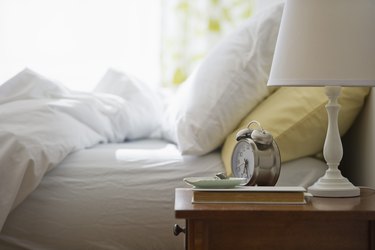
Video of the Day
1. Wind Down With a Hot Bath
There's no way around it — some nights you're going to need a little extra help. When those roll around, it helps to have a proven relaxation technique you can call on to help you unwind. A hot bath is one great option. Time spent soaking in meditation, prayer or in silence with deep breathing can be helpful.
Video of the Day
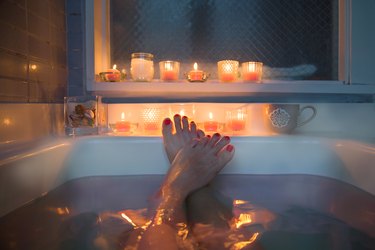
2. Block Out Light & Noise
This is one of those things that's so obvious, it's actually easy to overlook. For your sleep to be restful, your bedroom needs to be restful as well. Your window coverings need to block any distracting light, and ideally outside noise as well. If your work/sleep schedule means sleeping (or napping) while it's light out, invest in blackout curtains or a sleep mask to cover your eyes. Most importantly, don't use your bed as a place to just hang out. Your body relies on a lot of external signals to tell it when it's sleep time, and going to bed should be one of them.
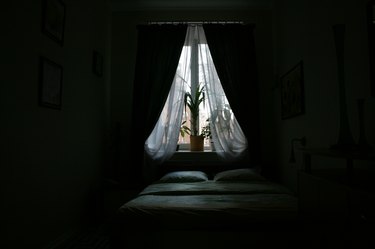
3. Upgrade Your Bedding
Suggesting that the quality of your bedding affects your sleep is a no-brainer, but – again – it's one of those things that's easy to overlook precisely because it's so obvious. There are lots of simple ways to sleep better without upgrading your mattress. Smooth, high thread-count sheets are more comfortable against your skin, and tend to last longer as well. If you struggle with the heat at night, choose sheets that wick heat and perspiration from your body. A mattress topper can add cushioning or cooling as needed. Finally, there are your pillows: Upgrading those alone can be a game-changer.
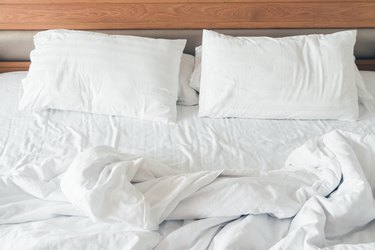
4. Set Your Biological Clock With Sunlight
It may sound counter-intuitive, but getting your best night's sleep starts with how you spend your morning. Your body relies on early-morning sunlight to calibrate its circadian rhythms, so structure a few minutes into your morning that you can spend near a window or — even better — sitting outside in the direct sunlight. Once you've established the habit, you may feel less stressed through the day as a result, which also helps promote sleep. In winter or when real sun isn't an option, "daytime" or full-spectrum light bulbs, the kind used to dispel Seasonal Affective Disorder, will give you the same benefit.

5. Get Active Earlier in the Day
Regular exercise has any number of health benefits, and better sleep is one of them. This doesn't mean you need to take on a serious fitness program or become a "gym rat," it just means consistently getting up and getting yourself in motion. Just a half-hour a day, four to six times a week, will do the job. That could mean walking to the store instead of driving, taking your dog to the park for some pitch-and-catch (Fido will thank you) or swimming a few laps instead of lounging beside the pool. Just don't do it too close to bedtime: The endorphins exercise produces can make it harder to doze off.
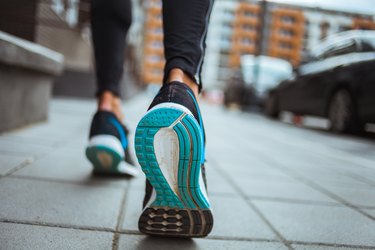
6. Monitor Alcohol, Caffeine and Tobacco Use
That first cup of coffee in the morning may be a highlight of your day, but if you have another after dinner you may regret it. Caffeine stays in your system for several hours after you consume it, so any time after lunch is probably too late. If you're a smoker, nicotine's stimulant effect can also impair your sleep. Drinking a nightcap is a bad idea, too: It may help you feel relaxed, but it impairs your brain's ability to enter the crucial, highly restful Rapid Eye Movement (REM) sleep state.

7. Stick to a Schedule
Simple consistency is one of the most important ways to help yourself sleep better. Set yourself a hard-and-fast bedtime that leaves you at least eight hours for sleeping, and stick with it. This helps your body develop a steady rhythm and get itself ready to sleep at the correct time. It'll take a few weeks for you to start seeing consistent results, but stick with it. If necessary, set an alarm on your phone to let you know when it's time to go to bed. Better yet, set the alarm so it signals the beginning of your wind-down time. That way you aren't in the middle of doing a dozen things when bedtime arrives.

8. Try Some Aromatherapy
All of your senses are engaged while you're up and active, and all of them, conversely, can help soothe you when you're trying to drift off to sleep. Calling on pleasant scents to help relax and unwind is one of the most common uses of aromatherapy in the home, and it's surprisingly effective. Scented candles are a bad idea when you're going to sleep (though they're great with a relaxing bath) so essential oils are your best bet. Apply a few drops of lavender, valerian, chamomile or other relaxing oil to a cloth or tissue, and leave it at your bedside or tuck it into your pillowcase.
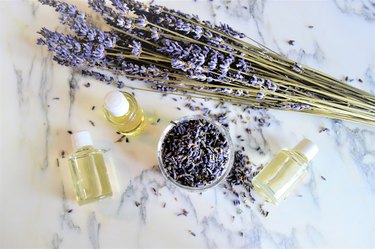
9. Practice Breathing Techniques
Deep, mindful breathing is a reliable way to get your body to slow down, which is why it's practiced by everyone from competitive athletes to meditation gurus. There are any number of specific techniques you can choose, so do a quick internet search and try a few until you find one that works for you. The basic idea is the same in each case: A deep, slow inhale; a pause while your lungs are filled; and then a slow, deliberate exhale. After a few repetitions your heart will slow, your body will relax, and you'll find it much easier to doze off.
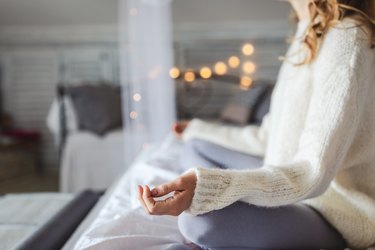
10. Avoid Late, Heavy Meals
Snacking in front of the TV is one of life's little pleasures, but bingeing can really cut into your sleep. That's not just due to the temptation of "one...more...episode," because "one...more...bite..." can also interfere with your sleep. Aside from the physical discomfort of trying to lay down with a too-full belly, you're increasing the likelihood of indigestion or acid reflux. This can make it harder to drift off, and harder to stay asleep once you're there. Either way, you're not getting the rest you need. That doesn't mean you can't snack, but keeping it light (and stopping earlier) will certainly help.
